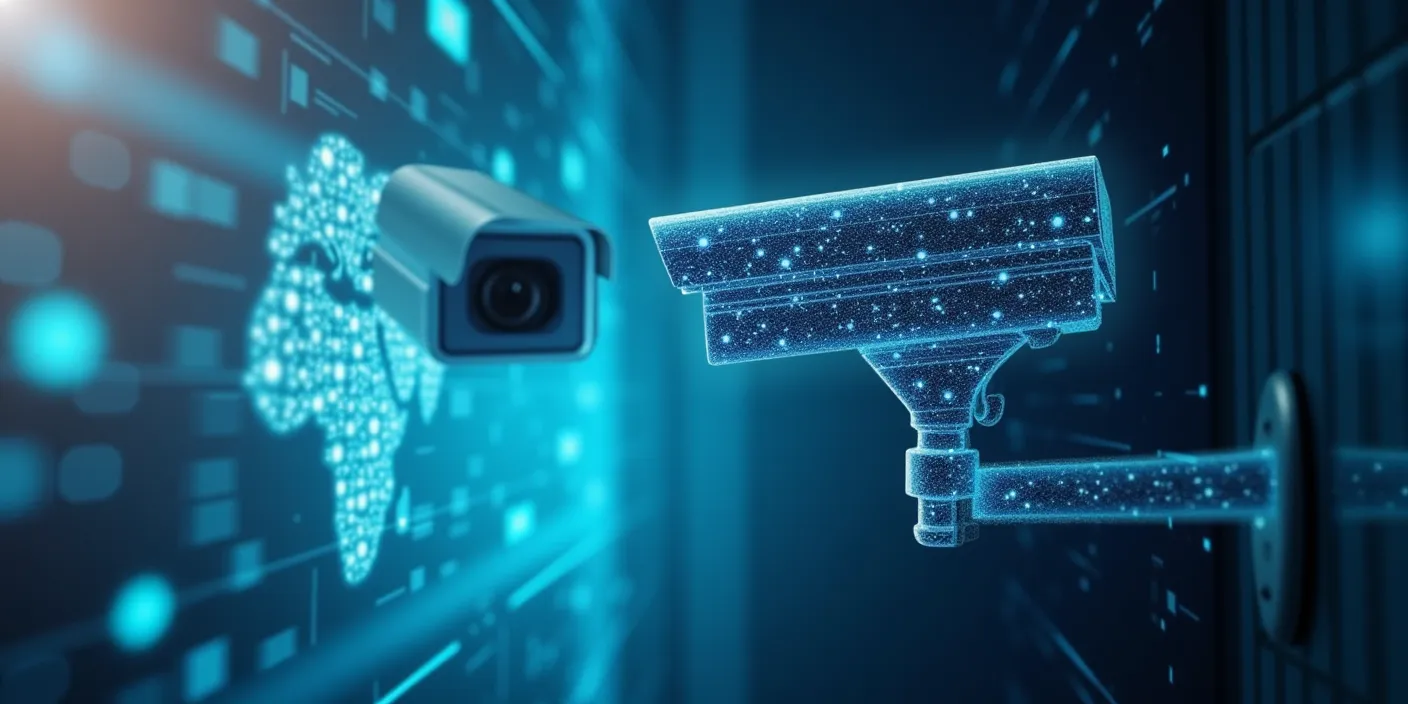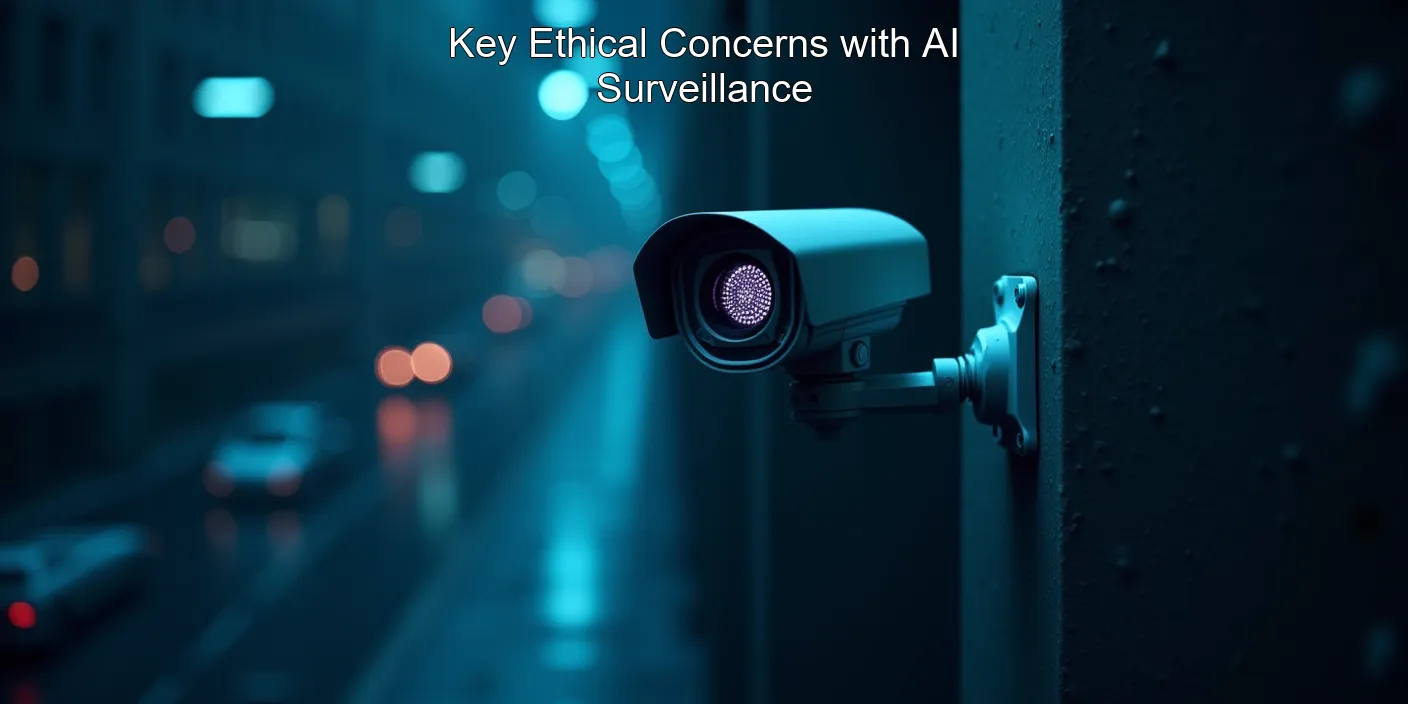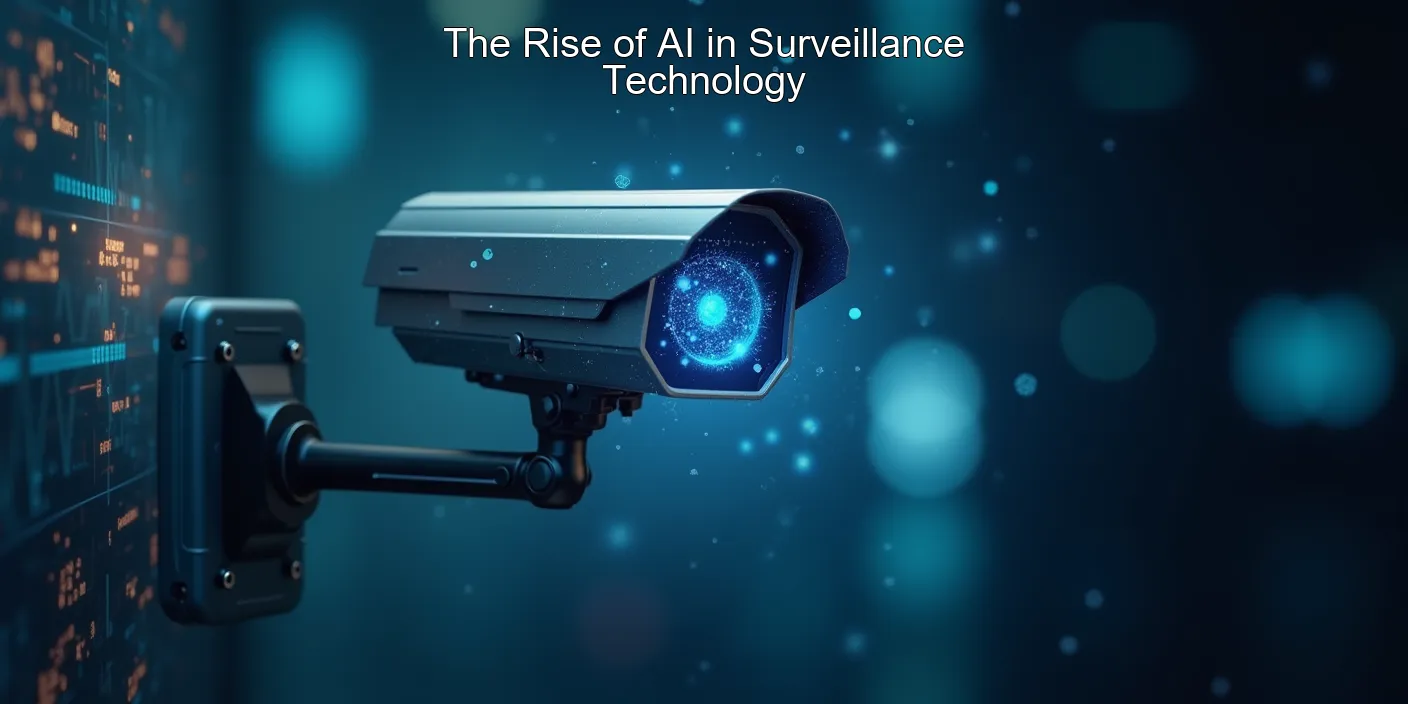Ethical Concerns of AI Surveillance: Balancing Security and Privacy
As artificial intelligence continues to advance, its use in surveillance technologies raises important ethical questions. While AI-powered surveillance systems promise enhanced security and efficiency, they also pose significant risks to privacy and civil liberties. This article explores the key ethical issues surrounding AI surveillance and how we can work towards responsible implementation.

#SurveillanceAI, #EthicalIssues, #AIPrivacy
Key Ethical Concerns with AI Surveillance

| Concern | Description |
|---|---|
| Privacy Invasion | AI systems can collect and analyze vast amounts of personal data |
| Bias and Discrimination | AI algorithms may perpetuate existing societal biases |
| Lack of Transparency | AI decision-making processes can be opaque “black boxes” |
| Potential for Abuse | Powerful surveillance tools could be misused by authorities |
The rapid adoption of AI surveillance raises several ethical red flags:
- Infringement on personal privacy and anonymity
- Risk of algorithmic bias leading to unfair targeting
- Lack of transparency in how AI systems make decisions
- Potential for misuse and abuse of surveillance capabilities
- Erosion of public trust in institutions using AI surveillance
“The challenge is to harness the power of AI surveillance to enhance security while implementing robust safeguards to protect individual rights and prevent misuse.” – Dr. Anita Allen, privacy law expert
Frequently Asked Questions
Q: How can AI surveillance violate privacy?
A: AI systems can collect and analyze vast amounts of personal data, including biometrics, location tracking, and online activities, potentially revealing sensitive information about individuals.
Q: What are the risks of algorithmic bias in AI surveillance?
A: AI algorithms trained on biased data may disproportionately target certain demographic groups, perpetuating discrimination and unfair treatment.
Q: How can we ensure ethical use of AI surveillance?
A: Implementing strong regulations, algorithmic transparency, and ongoing ethical audits can help ensure responsible development and use of AI surveillance technologies.
Best Practices for Ethical AI Surveillance
- Establish clear guidelines and regulations for AI surveillance use
- Ensure transparency in AI decision-making processes
- Implement robust data protection and privacy safeguards
- Conduct regular audits to detect and mitigate algorithmic bias
- Provide mechanisms for public oversight and accountability
According to a recent study, 78% of Americans are concerned about the privacy implications of AI surveillance technologies. As these systems become more prevalent, it’s crucial that we address the ethical challenges head-on.
“Americans’ AI Privacy Concerns: Ethical Solutions for Transparency & Accountability”
Balancing Security and Civil Liberties
While AI surveillance offers powerful tools for enhancing public safety and security, we must carefully weigh these benefits against potential infringements on civil liberties. Ethical AI principles should guide the development and deployment of these technologies to ensure they serve the greater good without compromising individual rights.
“AI Surveillance: Balancing Safety with Civil Liberties”
As we navigate the complex landscape of AI surveillance, it’s important to consider how these technologies intersect with other aspects of our lives. For instance, AI in Everyday Life is becoming increasingly common, raising questions about the boundaries between public and private spheres.
The entertainment industry is also grappling with the implications of AI surveillance, as explored in the realm of AI in Entertainment. From dystopian narratives to real-world applications in crowd management at events, the ethical concerns surrounding AI surveillance are permeating popular culture.
Looking ahead, AI Innovations in surveillance technology will continue to push the boundaries of what’s possible. It’s up to us as a society to ensure that these advancements are guided by strong ethical principles and a commitment to protecting individual rights.
By fostering open dialogue, implementing robust safeguards, and prioritizing transparency, we can work towards a future where AI surveillance enhances security while respecting privacy and civil liberties.
Ethical Implications of AI in Surveillance: Balancing Security and Privacy
As artificial intelligence continues to revolutionize various aspects of our lives, its application in surveillance systems raises important ethical questions. This article explores the complex landscape of AI-powered surveillance, examining both its potential benefits and the ethical concerns it presents.
The Rise of AI in Surveillance Technology

| Key Aspect | Description |
|---|---|
| Primary Use | Public safety and security |
| Key Technologies | Facial recognition, behavior analysis |
| Main Concern | Privacy infringement |
- Enhanced threat detection capabilities
- Improved efficiency in law enforcement
- Potential for abuse and misuse of data
- Challenges in ensuring algorithmic fairness
“The use of AI in surveillance is a double-edged sword. While it can significantly enhance public safety, it also poses unprecedented risks to individual privacy and civil liberties.” – Dr. Emma Thompson, AI Ethics Researcher
FAQ: AI Surveillance Ethics
Q: Can AI surveillance systems be biased?
A: Yes, AI systems can inherit biases from their training data, potentially leading to unfair targeting of certain groups.
Q: How can we ensure ethical use of AI in surveillance?
A: Implementing strict regulations, transparent policies, and regular audits can help maintain ethical standards.
Q: What are the privacy concerns with AI surveillance?
A: The main concerns include unauthorized data collection, potential for misuse, and the erosion of personal privacy in public spaces.
- Implement robust data protection measures
- Ensure transparency in AI decision-making processes
- Regularly audit systems for bias and fairness
- Establish clear guidelines for data usage and retention
- Involve diverse stakeholders in policy-making
According to a recent study, 68% of the public express concern about the ethical implications of AI in surveillance, highlighting the need for careful consideration and regulation in this field.
Balancing Security and Privacy: The Ethical Dilemma
| Aspect | Security Benefit | Privacy Concern |
|---|---|---|
| Facial Recognition | Quick identification of suspects | Potential for mass surveillance |
| Behavior Analysis | Early detection of threats | Invasion of personal space |
- The need for clear legal frameworks
- Importance of public awareness and consent
- Balancing national security with individual rights
- The role of AI in shaping future privacy norms
“We must strive to create AI surveillance systems that protect public safety without compromising the fundamental right to privacy.” – John Davis, Digital Rights Advocate
FAQ: Addressing Ethical Concerns
Q: How can citizens protect their privacy in an AI-surveilled world?
A: Stay informed about local surveillance laws, support privacy-focused initiatives, and be mindful of personal data sharing.
Q: What role does government play in regulating AI surveillance?
A: Governments are responsible for creating and enforcing regulations that protect citizen rights while allowing for necessary security measures.
Q: Can AI surveillance be made completely ethical?
A: While perfect ethical implementation is challenging, continuous improvement and strict oversight can significantly mitigate ethical concerns.
Steps Towards Ethical AI Surveillance
- Develop comprehensive ethical guidelines
- Invest in bias-free AI training methods
- Implement strict data access controls
- Encourage public discourse and transparency
- Regular ethical audits and impact assessments
A survey by the Pew Research Center found that 56% of Americans trust law enforcement agencies to use facial recognition technology responsibly, indicating a mixed public perception of AI surveillance.
As we navigate the complex terrain of AI in surveillance, it’s crucial to maintain a balance between leveraging technology for public safety and preserving individual privacy. By addressing Ethical AI concerns head-on, we can work towards a future where AI enhances security without compromising our fundamental rights. The ongoing dialogue between technologists, policymakers, and the public will be vital in shaping the ethical framework for AI surveillance in the years to come.
While AI surveillance presents significant challenges, it also offers opportunities for innovation in AI in Everyday Life. As we continue to explore these technologies, it’s important to consider their broader impact on society and how they intersect with other areas of AI Innovations. The entertainment industry, for instance, often reflects and influences public perception of surveillance technologies, making AI in Entertainment an interesting lens through which to examine these issues.
Understanding AI-Powered Surveillance Systems
| Key Aspects | Description |
|---|---|
| Technology | AI, Machine Learning, Computer Vision |
| Applications | Public Safety, Crime Prevention, Traffic Monitoring |
| Ethical Concerns | Privacy Invasion, Bias, Data Misuse |
AI-powered surveillance systems are revolutionizing public safety and security measures. Here’s what you need to know:
- Utilizes advanced algorithms for real-time monitoring
- Enhances threat detection and response capabilities
- Raises significant privacy and civil liberties concerns
- Requires careful regulation and oversight
“The challenge lies in harnessing the power of AI surveillance while safeguarding individual rights and freedoms.” – Dr. Emma Thompson, AI Ethics Researcher
Q: How does AI surveillance impact privacy?
A: AI surveillance can potentially infringe on personal privacy by collecting and analyzing vast amounts of data on individuals’ movements and behaviors.
Q: Can AI surveillance systems be biased?
A: Yes, AI systems can inherit biases from their training data, potentially leading to unfair targeting or profiling of certain groups.
Q: What are the benefits of AI in surveillance?
A: AI can enhance public safety, improve emergency response times, and aid in crime prevention and investigation.
- Implement strict data protection and privacy policies
- Ensure transparency in AI decision-making processes
- Regularly audit systems for bias and fairness
- Establish clear guidelines for data usage and retention
- Involve diverse stakeholders in system design and deployment
According to a recent study, 68% of citizens express concern about the potential misuse of AI surveillance technology.
Balancing Security and Privacy in the AI Era

| Aspect | Consideration |
|---|---|
| Security Benefits | Enhanced public safety, crime prevention |
| Privacy Risks | Data breaches, unauthorized surveillance |
| Ethical Framework | Transparency, accountability, consent |
As AI surveillance becomes more prevalent, striking the right balance between security and privacy is crucial. Consider these points:
“AI Surveillance: Balancing Security and Privacy in the Modern Era”
- Implement robust data encryption and protection measures
- Establish clear guidelines for AI-assisted decision-making
- Ensure public awareness and consent in surveillance areas
- Create independent oversight committees for AI surveillance systems
“We must design AI surveillance systems with ethics at their core, not as an afterthought.” – Prof. James Chen, AI Policy Expert
FAQ: Balancing Security and Privacy
Q: How can we ensure AI surveillance doesn’t infringe on civil liberties?
A: By implementing strict regulations, transparent policies, and regular audits of AI systems to prevent misuse and protect individual rights.
Q: What role does public opinion play in AI surveillance deployment?
A: Public opinion is crucial in shaping policies and ensuring that AI surveillance aligns with societal values and expectations.
Q: Can AI surveillance be made completely ethical?
A: While perfect ethics may be challenging, continuous improvement and adherence to ethical guidelines can significantly enhance the responsible use of AI in surveillance.
- Develop comprehensive ethical guidelines for AI surveillance
- Conduct regular impact assessments on privacy and civil liberties
- Invest in public education about AI surveillance capabilities and limitations
- Foster collaboration between technologists, policymakers, and ethicists
- Implement robust accountability measures for AI system operators
A survey reveals that 72% of experts believe that ethical AI surveillance is achievable with proper regulations and technological safeguards.

As we navigate the complex landscape of AI in surveillance, it’s crucial to prioritize Ethical AI practices. The integration of AI in our daily lives, including surveillance, highlights the need for responsible innovation in AI in Everyday Life. While AI surveillance presents challenges, it also offers opportunities for enhancing public safety through AI Innovations. Balancing these aspects requires ongoing dialogue and collaboration across various sectors, including AI in Entertainment, to ensure widespread understanding and acceptance of ethical AI practices.



